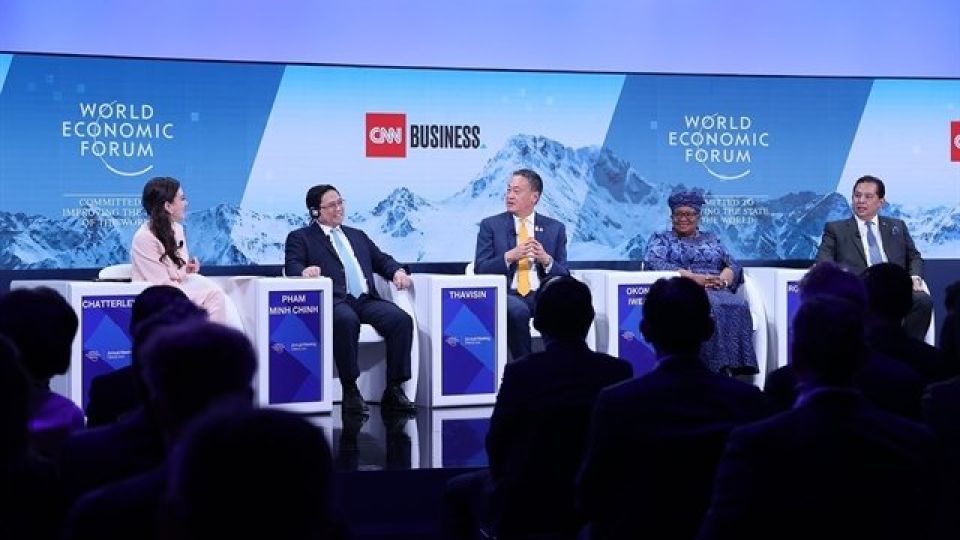January 18, 2024
HANOI – Prime Minister Phạm Minh Chính attended a discussion on ASEAN as a main speaker in the framework of the 54th Annual Meeting of the World Economic Forum (WEF-54) in Davos, Switzerland, on January 17 (local time).
Other speakers at the event included Thai Prime Minister Srettha Thavisin, Speaker of the Philippine Lower House Ferdinand Martin G. Romualdez and Director-General of the World Trade Organisation (WTO) Ngozi Okonjo-Iweala.
Speakers at the discussion held that ASEAN has become a model in regional economic integration, with each member striving to promote intra-bloc economic cooperation and exchange toward forming a common market and production base, while actively integrating in the global economic through a network of free trade agreements with partners and the Regional Comprehensive Economic Partnership (RCEP) agreement.
They said ASEAN member countries have built firm trust among them, overcome economic, political and cultural differences to become a bloc cooperating for prosperity.
The WTO Director General remarked that ASEAN has a friendly investment environment and thus is a destination beneficial to both investors and their partners. She described Việt Nam as a model destination with dynamic growth, which she said benefits not only one or several countries but also the world as a whole.
PM Chính underlined three important factors behind the development of ASEAN, which are unity in diversity, the resilience of the bloc as a whole and each member country, and inclusive development with the people as the subject, the centre and driver of development. Each country member contributes to ASEAN’s development and at the same time miximises their own potential, outstanding opportunities, competitive edges and capacity, while ensuring adherence to competition and demand-supply rule of the market, he said.
Regarding new opportunities such as a shift in the supply chain, PM Chính said it is an inevitable trend based on the rule of competition and supply-demand. He held that countries can only maintain sustainable development through choosing a win-win approach, respecting the choice of each country, and building trust based on sincerity, solidarity and interest balance.
He was of the view that the digital economy should be closely associated with green economy with reciprocal support and effect. The process of digital transformation should be conducted following a roadmap with steps suitable with the capacity of each country, taking into account disadvantaged groups, he said, laying emphasis on sustainable and rapid development without sacrificing equity and social security.
The Vietnamese Government leader envisioned that in the next five to 10 years, ASEAN will be a united bloc and the growth epicenter of the world where no one is left behind in economic development.
The Thai PM said cheap labour cost may be a competitive factor at first but later it could become a challenge to ASEAN development. He called on countries to raise the region’s minimum wage and enhance competitiveness to attract foreign investment.
The speakers at the discussion spoke highly of Việt Nam’s role in promoting unity within ASEAN and joining hands with ASEAN members in handling regional and global issues. They shared PM Chính’s view on ways to optimise opportunities and handle challenges during the win-win integration process of ASEAN.


